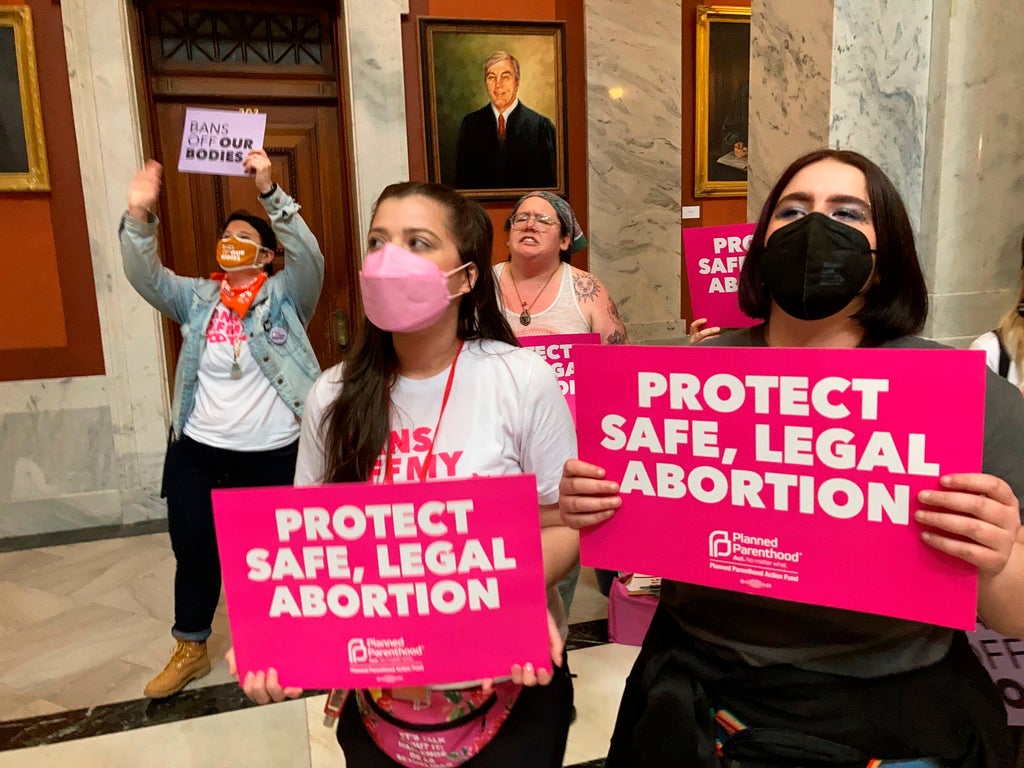
After state legislators approved a series of onerous restrictions against abortion providers and patients, Kentucky’s two remaining clinics will be forced to stop performing the procedure, effectively ending abortions in the state.
Kentucky’s sweeping omnibus anti-abortion legislation – which went into effect immediately after the state’s Republican-controlled legislature voted to override Governor Andy Beshear’s veto – bans abortions after 15 weeks of pregnancy, mirroring a Mississippi law at the centre of the US Supreme Court case that could upend decades of precedent establishing constitutional protections for abortion care.
House Bill 3 will “completely and immediately eliminate abortion access in Kentucky by piling on a laundry list of unnecessary abortion restrictions that are impossible for providers to comply with,” according to the ACLU of Kentucky.
The law also restricts minors’ access to the procedure and seeks to eliminate medication abortion, which accounts for roughly half of all abortions in the state. The law also makes no exception for cases involving rape or incest
“The Kentucky legislature was emboldened by a similar 15-week ban pending before the Supreme Court and other states passing abortion bans, including in Florida and Oklahoma, but this law and others like it remain unconstitutional,” according to Brigitte Amiri, deputy director of the ACLU Reproductive Freedom Project.
The organisation intends to file two lawsuits in US District Court on behalf of the state’s two clinics, Planned Parenthood and EMW Women’s Surgical Center, arguing that the law establishes an unconstititional de facto ban on in-state abortions with an “impossible” list of restrictions.
A statement from Planned Parenthood said the state legislature’s “sole goal” with the legislation “is to shut down health centres and completely eliminate abortion access in the state.”
“We are confident that the courts will stop this cruel and unconstitutional omnibus,” according to the organisation. “Everyone deserves to make their own decisions about their bodies, lives, and futures.”
The law also requires abortion patients to file “birth-death certificates,” and physicians must report each procedure to the state, along with the procedure method and lengthy biographical details about each patient and their sexual partner.
It also bans telemedicine appointments allowing patients to access medication abortion, and doctors are required to have registered hospital admitting priveleges with the state before being able to administer the drugs, typically a combination of FDA-approved drugs mifepristone and misoprostol.
Those drugss cannot be given to a patient without obtaining their “informed consent” at least 24 hours earlier, a process that involves patients signing a government document with the unsubstantiated acknowledgment it “may be possible to reverse the effects of the abortion-inducing drug if desired but that this should be done as soon as possible.” Such claims have been refused by the American College of Obstetricians and Gynecologists as“not based on science” and do “not meet clinical standards.”
Local hospitals also may refuse abortion providers to hold admitting privileges at their facilities, making it impossible for patients in many parts of the state to even seek out that care. The Supreme Court has previously struck down similar measures in Louisiana and Texas.
“Make no mistake: the Kentucky Legislature’s sole goal with this law is to shut down health centers and completely eliminate abortion access in the state,” Planned Parenthood Federation of America and Planned Parenthood Great Northwest said in a statement.
The law also makes it a felony for physicians to perform an abortion for a minor patient, unless they have written consent from a parent or legal guardian, even in cases of incest.

Kentucky’s veto override follows Oklahoma Governor Kevin Stitt’s signature on a law to make performing abortion illegal in the state, with providers facing felony charges with up to 10 years in prison and fines of up to $100,000.
Governor Stitt also is expected to sign more bills that would effectively ban all abortion after six weeks of pregnancy and bar physicians from performing or inducing an abortion at any point unless it is “to save the life” of the pregnant person. Those would immediately take effect once signed.
The legislation joins a wave of anti-abortion bills from Republican state legislators across the US, emboldened by the US Supreme Court’s anticipated ruling in a Mississippi case that could determine the fate of healthcare protections for women if the decades-old precedent from the ruling in Roe v Wade is overturned.
More than 500 abortion restrictions have been proposed in state legislatures in 2022, according to Planned Parenthood.
Should the Supreme Court reject precedent from the landmark Roe ruling, more than two-dozen states already have in place so-called “trigger bans” and other abortion restrictions that would immediately outlaw abortion care.







